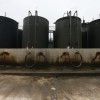Background
Texas leads the nation in natural gas production, holding around 23 percent of the nation’s natural gas reserves. Natural gas is primarily methane (CH4) and is considered to be a more environmentally friendly fuel than oil. Methane is a nonreactive hydrocarbon, which means its emissions do not react with sunlight to create smog.
Natural gas is used for heating, generating electricity and making transportation fuel. It is also a raw material found in plastics, medicines, fertilizers and dyes. According to the U.S. Department of Energy, 22 percent of energy consumption in America comes from natural gas.
Natural gas in Texas was first discovered as a by-product of oil. As oil production and exploration increased, gas production began to rise, peaking in 1972 with a total of 9.6 trillion cubic feet produced annually in Texas. Texas has maintained a steady level of natrual gas production with the help of the discovery of major natural gas fields such as Newark, East field in North-Central Texas, the Carthage field in East Texas, the Panhandle, West field in the Anadarko Basin, and the Giddings field in the Gulf Coast Basin. Texas natural gas production levels have also been maintained by an increasing number of production wells, which are now at an all-time high. Today many of the new exploration and production activities in Texas involve natural gas rather than oil.
Most of the natural gas production in the U.S. is concentrated around Texas and the Gulf of Mexico. A study by the U.S. Energy Information Administration (EIA), Oil and Gas Journal and World Oil showed that the U.S. contains 3 percent of the world’s total natural gas reserves. Of this 3 percent, nearly half of the production occurs in Texas and Louisiana. The largest onshore natural gas field in Texas is the Barnett Shale field in the Bend Arch-Fort Worth Basin in north central Texas.
The EIA found that between 2004 and 2009 the number of natural gas production plants in Texas decreased (contrary to the national increase) while the average capacity per plant increased. Texas has a total of 163 natural gas production plants with an average of 19.7 billion cubic feet of natural gas produced per day, making it the state with the largest processing capacity in the nation.
Natural gas distributors in Texas include the Texas Gas Service, the Gateway Energy Corporation, and the West Texas Gas, Inc.
Natural gas remains an important contributor to Texas’ economy. In 2006, more than 312,000 Texans (3.1 percent of the state’s workforce) were employed by the oil and natural gas industry. The industry accounts for 14.9 percent ($159.3 billion) of Texas’ gross state product.








